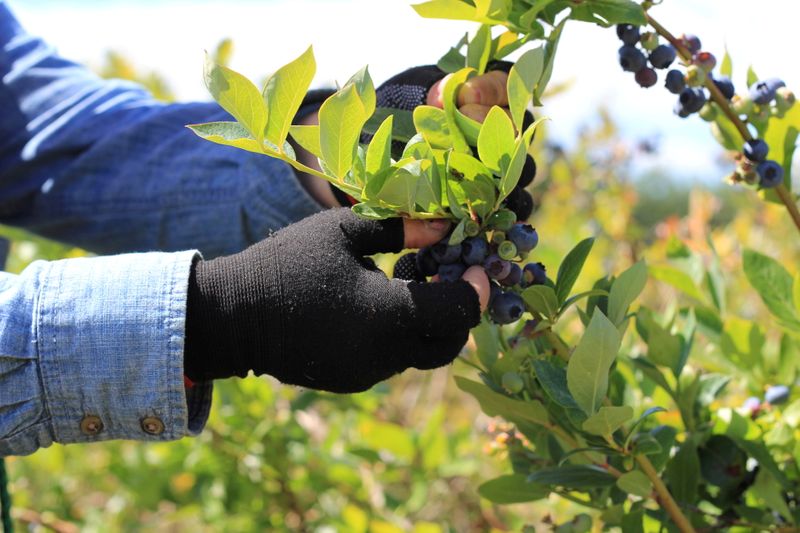
© Reuters. FILE PHOTO: A blueberry picker picks fruit at Lohas Farms in Richmond, British Columbia, Canada on July 3, 2016. REUTERS/Julie Gordon//File Photo
By Anna Mehler Paperny
TORONTO (Reuters) – As the COVID-19 pandemic raged, Canadian government inspectors frequently deemed the employers of migrant workers compliant with health and safety rules despite a lack of evidence, according to an Auditor General report released Thursday.
While Canadian provinces and territories set housing standards, the federal government is responsible for ensuring that tens of thousands of migrant farmworkers have adequate accommodation and their employers comply with quarantine rules.
Employment and Social Development Canada has been carrying out reviews of living spaces and workplaces. The vast majority of these inspections since April 2020 have been done virtually. In 2020, Canada found 99.6% of inspected employers compliant; in 2021, it was 100%.
Auditor General Karen Hogan’s office warned of inspection problems in late 2020 but things worsened, the audit found, with 88% of quarantine inspections deemed “problematic” compared with 73% the previous year.
“I think they had a lot of information and really should have acted on it, and I am disappointed that the situation didn’t improve,” Hogan said in an interview.
“It’s a pretty big failure.”
The COVID-19 pandemic hit migrant workers hard as many lived in congregate settings that fueled transmission. In light of the pandemic and recent wildfires and floods in British Columbia, Mexico is trying to change the conditions of Canada’s Seasonal Agricultural Workers Program to better protect workers.
Eighty percent of the COVID-19 outbreak inspections the auditor reviewed sat inactive, even as they required time-sensitive responses to ensure worker safety. Sometimes inspectors had information indicating noncompliance with pandemic regulations but labeled employers as compliant anyway, the audit said.
Employment and Social Development Canada agreed with the audit’s recommendations.
“The Temporary Foreign Worker Program was not designed to deal with a pandemic. As a result, rules, procedures, and training had to be developed in real time,” the department said in a statement included in the audit.
Canada’s C$68.8 billion ($54.2 billion) agricultural sector relies heavily on migrant workers. More than 79,000 migrants came to work in Canada’s agricultural sector between March 2020 and June 2021.
But Hogan said migrant workers are also “human beings who are relying on their employer to give them accommodations.”
($1 = 1.2695 Canadian dollars)
Source: Investing.com



























